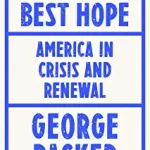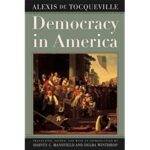I watched the Reagan years with an ever-increasing sense of impending doom. I say watched because I was an outsider to the economic and social changes, living in one of the separate worlds, bubbles–the slices George Packer describes. I was teaching at the University of California, Santa Barbara, writing, adjusting to a new school, a new town, a new life. Though I was a lecturer (not on the tenure track) and had to apply for my job every year, I felt more secure than I had since I was divorced. I headed up the lecturers’ union that won, three-year contracts, renewal upon review—a major achievement for teachers long viewed as “temporary.”
As I write those words, I realize the academic world I had always been a part of had been moving away from community commitment toward individualism for many years. Tenure, at the nation’s larger universities was granted for individual achievement in research, not teaching. “Publish or perish” leaves no room for teaching citizenship. The still-necessary lip-service to education fulfilled by teaching assistants and lecturers.
But Reagan crowned the individual seeker as king, and thus set him free of responsibility to the community. As George Packer said, “Americans went on a self-centered spree that continued for half a century while the common good withered away.” (P.78). Reaganism joined Milton Friedman’s premise that the market, if set free of government interference, would automatically produce prosperity. Together they became a blind force that mowed down everything before it. “Take Care of Number One” was the motto of the Eighties and Nineties. Privatization was the game. Success was measured in numbers—market share and profit—and profit grew fastest by reducing labor costs. In the numbers world, “the bottom line,” was the sole measure of value and labor reduction was renamed “efficiency.”
The simultaneous arrival of the tech revolution added fuel to the fire, promising a new world of wealth to the educated young, unemployment to the rest. The speed of change was beyond anything imaginable to those of us born before the internet. The changes were far too vast to go into now, except to add its force to the gathering storm.
Each day brought news of small companies swallowed up, large corporations departed for Mexico, labor unions decimated. Wall Street cheered rising profits and market share. Main Streets were boarded up as the nation’s leaders celebrated the “prosperity.” Hospitals, schools, prisons, and the military were privatized. Pensions and other benefits disappeared. The cost of medical insurance rose even as insurance companies shed the sick. Giant corporations burst their national bounds and globalized, leaving rusting factories in their wake. Wall Street was booming, hedge funds were born as the elite gambled with the money sucked up from below. Still, the Democratic Party spoke only of minority groups. Politicians and journalists spoke of the increasing gap between rich and poor as though it was a state of being, like the geography—not the cause for any action.
And it went on. Packer puts it well:
The civic associations that Tocqueville identified as the antidote to individualism died with the jobs. When towns lost their Main Street drugstores and restaurants to Walgreens and Wendy’s in the big-box mall out on the highway, they also lost their Rotary Club and newspaper—the local institutions of self-government. This hollowing out exposed them to an epidemic of aloneness, physical and psychological. Middle-class people lived on debt to avoid falling into poverty, but they fell anyway. (P.48)
I well remember the sense of isolation that deTocqueville predicted when the sense of being a part of a community vanished. Were there others out there who saw the insanity of what was happening? In George Packers words,
“What did freedom mean to a laid-off machinist whose company was bought out by private equity investors, stripped for assets, and his job sent across the border, while he found work as a security guard at Home Depot for half the pay?” (P.48)
Was the corporate manager glued to his cell phone 24/7 free? Yes. Of time for family, community, or anything but the company that enslaved him. Story after story told of debt leveraging debt. Was there really any money anywhere? Could anyone find it? Was there anyone out there besides my housemate and me who thought this was insane? How do you reach them? The walls of their “bubbles” were impenetrable.
Then, in 2008, Wall Street exploded, and Obama came to power. For a while it felt as though we might be saved from ourselves. But it was too late. The Republican Party had been subsumed by extremists, and Wall Street, after the initial jolt forced the government to save it from ruin, resumed its activities unchanged. Obama faced a government that had already been bought out by the financial giants. Perhaps the most ironic, and for me the most bitter, the Democratic Party treated the election as a victory for minority America even though it was working-class America who had elected him.
And onto this stage walked Trump.




Comments are closed.